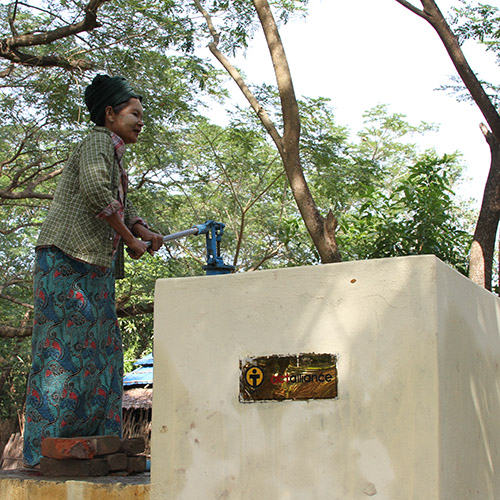Stories of Change

A resident of Inn Ma Su village uses one of the newly elevated hand pumps. Photo: Andrew Gifford / CWS
Elevated hand pumps mean year-round clean water access in Myanmar
In the heart of Inn Ma Su village, there is a huge, sturdy tree in the middle of a large clearing. There’s a sign on the tree that makes very little sense for many months of the year. It asks that you drive boats slowly in the vicinity.
During the rainy season, though, the importance of that sign becomes clear. Flooding isn’t a question during the rainy season in this small riverside town. It’s a way of life.
In the Ayeyarwady Region of southwest Myanmar, the massive river system is critically important. It is a highway for both transportation and information sharing that allows remote villages to communicate and travel year round to reach public services, like clinics, as well as work and other opportunities in larger towns.
One thing the river is not, though, is potable. River water is not safe for drinking. It is contaminated by many things, including runoff from latrines.
When the Ayeyarwady River flooded early last year, donor support meant that CWS and partners could bring household water filters to affected villages to help ensure that families had clean, safe water while they waited for the flooding to recede from around their hand pump well.
In the fall of 2016, however, our CWS team and partners worked with the people of Inn Ma Su to create a more permanent source of safe water. Together, and with donor support, we built concrete platforms with stairs for four hand pumps. Each platform also has a small water tank. Water is pumped into the tank and then can be used to easily fill buckets using the spout in the side of the platform.
Before the platforms, the community’s hand pumps were at ground level, similar to this one in a nearby village. That meant that they were often flooded and unusable in the rainy season, and they were almost always muddy.
Now, even in the dry season, the new platforms ensure cleaner, dryer areas around the pumps. And in the rainy season, they guarantee access to safe, clean water – even when getting to the platforms means using a boat.
Interestingly, many of the hand pumps are on private land, but it is customary for families to allow free access to their yards so their neighbors can also collect water from the pump. During the dry season, three or four households use a hand pump daily. In the rainy season, though, as fewer hand pumps are accessible, more families will rely on the now-elevated pump.
Apart from the wells CWS and Week of Compassion donors have just helped improve, the challenges facing Inn Ma Su are numerous. The nearest school is a 30-minute walk away, which is long enough in the dry season. In the rainy season, many students stop attending school due to flooded fields, muddy footpaths and a dangerously weak bridge. Also, the villagers want to prioritize finishing their work on a new monastery which, critically, doubles as a village shelter in the event of cyclones or other natural disasters.
With improvements to the four hand-pump wells now done, the partnership between Inn Ma Su and CWS is not over, and we are proud to reach this milestone of ensuring better access to potable water.
